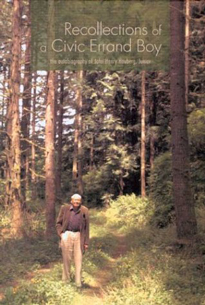|
John Henry Hauberg
Junior - Autobiography
John Henry Hauberg Jr. was born in 1916 in Rock Island, Illinois. His maternal
grandfather, F.C.A. Denkmann, and great uncle, Frederick Weyerhaeuser, had
purchased a sawmill on the banks of the Mississippi in 1860. This modest
enterprise was the foundation of the Weyerhaeuser Company, a lifelong
partnership and family business which continues to this day. Hauberg's father,
John Henry Senior, was fascinated by Native American history and crafts and
passed on his interest to his son. When Hauberg Jr. moved to Seattle, he became
involved with the tribes and individual artists of Western Washington, British
Columbia, and Alaska. Part of Hauberg's legacy to the city of Seattle is
a stunning collection of Pacific Northwest Coast Indian art that can be seen at
the Seattle Art Museum. After serving in World war II Hauberg founded the
Pilchuck Tree Farm, a 16,000 acre research tree farm north of Arlington in
Snohomish and Skagit Counties. In 1971, Dale Chihuly came to him with a
proposal to hold a glassblowing summer workshop on the tree farm. The rest, as
they say, is history. In addition to the Pilchuck Glass School, Hauberg
was involved with the community in many ways - the Bush School, Reed College,
the UW College of Forest Resources, the Seattle Opera, the Seattle Art Museum,
the Seattle Symphony, the Pilot School for Handicapped Children, the Child
Development and Retardation Center, the American Federation of Art, the
American Crafts Council, and the Republican Party, among many others.
Hauberg's autobiography Recollections of a Civic Errand Boy (2003)
chronicles a life of extraordinary generosity to the arts and the musical and
educational institutions of Washington State.
|

